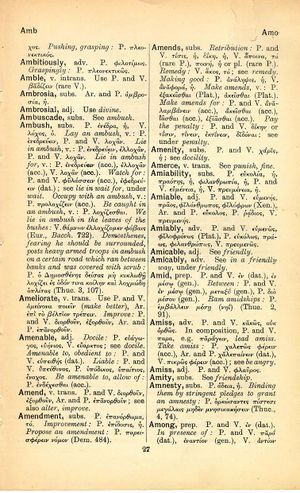ambrosia
τί δ' ἢν ῥαφανιδωθῇ πιθόμενός σοι τέφρᾳ τε τιλθῇ, ἕξει τινὰ γνώμην λέγειν τὸ μὴ εὐρύπρωκτος εἶναι; → What if he should have a radish shoved up his ass because he trusted you and then have hot ashes rip off his hair? What argument will he be able to offer to prevent himself from having a gaping-anus | but suppose he trusts in your advice and gets a radish rammed right up his arse, and his pubic hairs are burned with red-hot cinders. Will he have some reasoned argument to demonstrate he's not a loose-arsed bugger
English > Greek (Woodhouse)
subs.
Ar. and P. ἀμβροσία, ἡ.
Latin > English (Lewis & Short)
ambrŏsĭa: ae, f., = ἀμβροσία>.
I Lit., ambrosia, the food of the gods (as nectar was their drink): non enim ambrosiā deos aut nectare laetari arbitror, Cic. Tusc. 1, 26, 65; Ov. P. 1, 10, 11: Suaviolum dulci dulcius ambrosiā, Cat. 99, 2.—Hence: orator ambrosiā alendus, prov. once in Cic., qs. a god among orators, of a distinguished orator (opp. faenum esse), Cic. de Or. 2, 57.— Also food for the steeds of the gods: equos ambrosiae suco saturos, Ov. M. 2, 120; 4, 215 (acc. to Hom. Il. 5, 368 and 369).—
II Transf.
A The unguent of the gods (so, ἀμβροσία>, Hom. Il. 14, 170; 16, 670): ambrosiā cum dulci nectare mixtā Contigit os, Ov. M. 14, 606: liquidum ambrosiae diffundit odorem, Verg. G. 4, 415; id. A. 12, 419.—
B The name of several plants, esp. of the botrys or artemisia, Turkish mugwort: Choenopodium botrys, Linn.; Plin. 27, 4, 11, § 28.—Another plant of this name, Plin. 27, 8, 31, § 55.—
C An antidote to poison, Cels. 5, 23.

